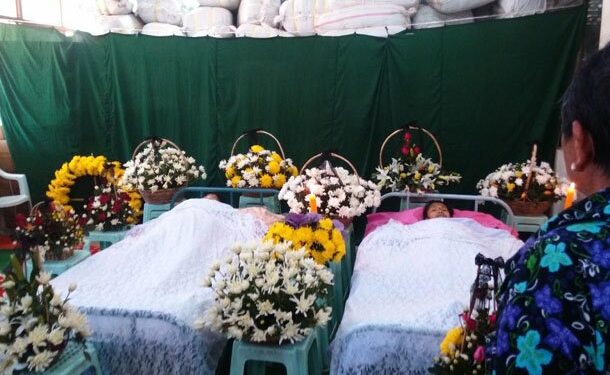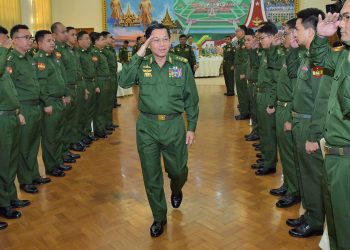RANGOON — A Burma Army-owned media outlet has warned against linking government troops to the recent murder of two Kachin teachers, saying that the army would take legal action against anyone who alleges that soldiers were involved in the crimes.
Military-run news outlet Myawaddy published a statement on Wednesday saying that an investigation into the double murder had failed to implicate government soldiers.
“There is an ongoing investigation into the crime but we found there are accusations and attacks on the Tatmadaw […]. The Tatmadaw was not involved in this murder case according to evidence analyzed by criminal police and other cooperating investigation teams,” it said.
“The Tatmadaw will take action based on the rule of law against those who accuse [soldiers] and write about it after the official report is released by the investigation team.”
Maram Lu Ra and Tangbau Hkawn Nan Tsin, both 20 years old, were killed on Jan. 19 and their partially-clothed bodies were found in their shared dormitory in Kaung Kha village, Kutkai Township, northern Shan State, on Jan. 20. The two young women were volunteering for the Kachin Baptist Convention (KBC) at the time of their death.
An autopsy was carried out at Muse Hospital and sources inside the hospital have said doctors had determined both victims were raped. The report has yet to be made public. KBC sources have said that authorities were investigating the case on suspicions of murder and rape.
Locals, Kachin activists and KBC have alleged that the murders coincided with Light Infantry Battalion 503’s presence in the area, fueling speculation that a soldier or soldiers were behind the crime.
Shan State police have said they found hair samples at the crime scene that they were DNA testing for a match with 20 soldiers stationed in the area, as well as with 10 local villagers. Police told The Irrawaddy that army officers have become involved in the investigation and sealed off the crime scene.
The Myawaddy statement on Wednesday said the army was “helping” the investigation team carry out DNA test on its troops.
Zaw Htay, director of the President’s Office, said in a reaction on Thursday that the army had the right to publicly defend itself against accusations against its troops, adding that the army would not issue idle threats.
“Unless the court decides you are guilty, they only can call you a suspect,” he told The Irrawaddy, “So, the Tatmadaw also have the right to protect itself based on our Constitution. If you say the Tatmadaw killed them, this means the whole institution of the Tatmadaw is involved.”
When asked if journalists were at risk, Zaw Htay, who shared the army’s statement on his Facebook page, said media outlets could face legal action if they report that the army carried responsibility for the murders.
Aung Thu Ra, a senior reporter from 7 Day Daily News, said he did not think that the army would take newspapers to court for reporting on the allegations.
“The army is trying to have better relationship with media, but they may take action against some civil organizations that provide information [on the case],” he said, adding that media organizations were not wrong to quote allegations made by rights groups.
The grisly murders caused a public outcry and raised tensions between Kachin ethnic communities and the army, which has long been accused of carrying out abuses and sexual violence against minority communities with impunity.
KBC sent a letter to President Thein Sein on Jan. 23 urging him to find the killers of the teachers in order to “build trust between the Tatmadaw and the ethnic people,” adding that “Even though [Light Infantry Battalion] 503 denied involvement in the killing, our people believe their members were involved.”
Wednesday’s statement could send a chill through Burma’s media and civil society sector as the army remains powerful and has a strong influence over the court system, which came under its direct control during previous decades of brutal junta rule.
In July 2014, the army’s power was on display after a report in the now-defunct Unity Journal alleged that chemical weapons were being produced at a secretive army installation in Magwe Division’s Pakokku Township. Three reporters, an editor and the publication’s CEO were charged under the colonial-era State Secrets Act and sentenced to 10 years in prison with hard labor.
In a further show of the army’s enduring powers, a National Human Rights Commission investigation into the killing of a freelance reporter at the hands of the army in Mon State in September 2014 failed to name any suspects among army units serving in the area.

















